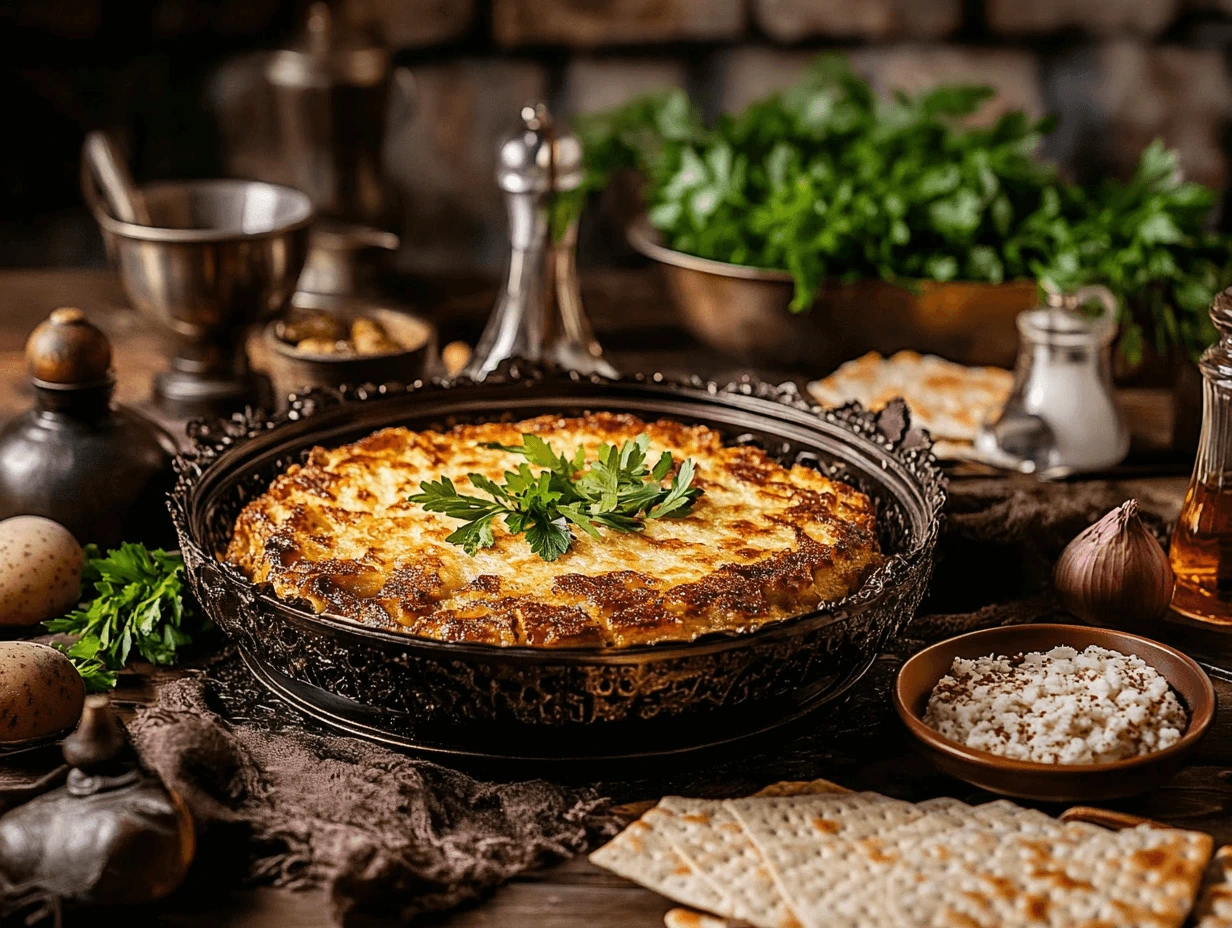Can Jews Eat Potatoes During Passover?
Introduction
Passover, or Pesach, is one of the most significant Jewish holidays. It is filled with traditions and dietary laws shaping Jewish culture for thousands of years. During this time, Jewish families honor the Exodus from Egypt. They follow strict rules about what they can and cannot eat. This tradition often raises questions like, “Can Jews eat potatoes during Passover?”
In this article, we’ll explore the fascinating connection between Passover dietary laws and potatoes. We’ll explore why potatoes are widely considered acceptable. We’ll also look at how they became a Passover staple and their role in Jewish cooking. Along the way, we’ll also discuss cultural and health perspectives, providing a comprehensive understanding of this important topic.
Let’s dive in and discover everything about potatoes and their place in Passover traditions!
Understanding Passover Dietary Laws
What Are the Core Dietary Restrictions During Passover?
Passover dietary laws revolve around avoiding chametz, which refers to leavened foods made from five specific grains: wheat, barley, oats, spelt, and rye. These grains become chametz when they come into contact with water for more than 18 minutes without being baked. To honor this tradition, Jewish households meticulously clean their kitchens and ensure no chametz remains.
In addition to chametz, Ashkenazi Jews often avoid kitniyot, a category that includes legumes, rice, corn, and certain seeds. This custom, although not a strict halachic (Jewish legal) requirement, developed in medieval times to prevent confusion between kitniyot and chametz. On the other hand, Sephardic Jews typically don’t follow this restriction, which highlights the diversity of Jewish practices during Passover.
The Role of Kitniyot and Chametz in Ashkenazi and Sephardic Traditions
The inclusion of kitniyot adds an extra layer of complexity to Passover dietary customs. For Ashkenazi Jews, these restrictions can limit meal options significantly, pushing them to rely on vegetables like potatoes as a versatile and filling alternative. Meanwhile, Sephardic Jews often incorporate a wider variety of ingredients, making their Passover dishes more varied.
Given this backdrop, potatoes play an important role in providing a chametz-free and kitniyot-free ingredient that unites diverse Jewish traditions during Passover.
Potatoes and Their Permissibility During Passover
Why Potatoes Are Considered Passover-Friendly
One of the most common questions during this holiday is, “Can Jews eat potatoes during Passover?” The answer is a resounding yes. Potatoes do not contain chametz since they do not come from the five grains prohibited during Passover. Additionally, they do not fall into the category of kitniyot, making them suitable for both Ashkenazi and Sephardic traditions.
Because potatoes are simple, unprocessed, and versatile, they fit perfectly into the Passover dietary framework. Their starchy texture also provides an excellent substitute for grains in many recipes, creating a hearty and satisfying addition to meals.
To maintain their kosher status during Passover, individuals must prepare potatoes with utensils and equipment free from chametz contamination. This approach ensures they follow the strict dietary rules of the holiday.
Cultural Variations in Potato Consumption Among Jewish Communities
While potatoes are widely accepted, how they are used can vary greatly among Jewish communities. For Ashkenazi Jews, potatoes often become the star of the meal due to restrictions on kitniyot. From potato kugels to mashed potatoes, these dishes are a staple during the week of Passover.
On the other hand, Sephardic Jews, who typically include rice and legumes in their Passover menus, view potatoes as just one of many options. This cultural distinction highlights the adaptability of Passover cooking to regional traditions and available ingredients.
In essence, the question “Can Jews eat potatoes during Passover?” reflects the broader diversity of Jewish customs and underscores potatoes’ unique role in uniting these varied traditions.
The History of Potatoes in Passover Cuisine
When and How Potatoes Became a Staple in Passover Meals
The historical significance of potatoes during Passover dates back to their introduction to Europe in the 16th century. As potatoes became more accessible and affordable, Jewish communities quickly recognized their potential as a chametz-free ingredient.
In Eastern Europe, where wheat was scarce and dietary restrictions were more rigid, potatoes emerged as a vital food source during Passover. They offered a practical solution for creating filling meals without violating Passover laws. Over time, potatoes became synonymous with Ashkenazi Passover cooking, cementing their place in the holiday tradition.
Examples of Traditional Passover Dishes Made with Potatoes
Potatoes’ versatility has inspired a wide array of Passover dishes. Classic examples include potato kugel, a savory casserole often baked to golden perfection, and latkes, crispy potato pancakes enjoyed with applesauce or sour cream.
Another beloved dish is matzo ball soup, where potatoes can be used to create gluten-free variations. For a creative twist, many families experiment with stuffed potatoes, blending vegetables and kosher-for-Passover herbs for a flavorful side dish.
These recipes not only answer the question “Can Jews eat potatoes during Passover?” but also showcase how potatoes have become a symbol of resourcefulness and tradition during this sacred holiday.
Culinary Uses of Potatoes for Passover
Potato-Based Passover Recipes: Kugels, Latkes, and More
Potatoes play a versatile role in Passover cooking. Their use in traditional recipes answers the question, “Can Jews eat potatoes during Passover?” Potato kugel, a baked casserole with a crispy top and soft interior, is a staple at Passover meals. Similarly, latkes, or potato pancakes, add a crispy and savory element to the table. They are often served with applesauce or sour cream.
For those seeking lighter options, mashed potatoes seasoned with kosher-for-Passover herbs make a comforting side dish. Additionally, potato starch, derived from potatoes, is a popular ingredient for thickening soups and creating baked goods during Passover, offering a chametz-free alternative.
If you’re curious about incorporating more potato-based dishes into your holiday menu, consider trying a Passover-friendly recipe like Passover Potato Pie, a unique twist on traditional potato kugel.
Substituting Potatoes for Kitniyot in Sephardic Recipes
In Sephardic communities, where people include kitniyot such as rice and legumes in their diets, potatoes often play a less central role. However, Ashkenazi families often use potatoes creatively to replace kitniyot in recipes like casseroles, soups, and mock rice dishes made with grated or diced potatoes.
For instance, cooks can adapt a classic Sephardic rice dish by using shredded potatoes as a base, seasoning them with turmeric and herbs. This flexibility allows potatoes to bridge dietary traditions while offering delicious and kosher Passover meals.
Health and Nutrition Considerations

Nutritional Benefits of Potatoes During Passover
Potatoes are not just a practical choice—they’re also packed with nutrients that make them a valuable addition to Passover meals. Rich in vitamin C, potassium, and fiber, potatoes support digestive health and provide sustained energy, which is especially important during the holiday’s often heavy and rich meals.
Additionally, potatoes are naturally gluten-free, making them an excellent option for those who avoid gluten during Passover. By including dishes like potato kugel or mashed potatoes in your menu, you’re incorporating a healthy and filling food that’s easy to prepare and universally loved.
Balancing Potato Dishes with Other Passover-Friendly Foods
While potatoes play a vital role, it’s essential to balance your meals with other fresh vegetables and proteins. Adding roasted carrots, steamed greens, or grilled fish to your Passover spread can create a more varied and nutritious meal. This approach ensures you enjoy the benefits of potatoes without over-relying on them.
If you’d like more inspiration for your Passover table, check out other creative recipes on Timeless Recipes.
FAQs About Potatoes and Passover
Are All Potatoes Kosher for Passover?
In Sephardic communities, people include kitniyot such as rice and legumes in their diets, so they often give potatoes a less central role. However, Ashkenazi families creatively use potatoes to replace kitniyot in recipes like casseroles, soups, and mock rice dishes made with grated or diced potatoes.
For example, cooks adapt a classic Sephardic rice dish by shredding potatoes as a base and seasoning them with turmeric and herbs. This flexibility helps potatoes bridge dietary traditions while delivering delicious and kosher Passover meals.
For those who prefer homemade options, preparing dishes from fresh potatoes is both economical and reassuring. This allows you to fully control the ingredients and preparation process, ensuring they align with Passover dietary laws.
Conclusion
Why Potatoes Are Essential to Passover Meals
In answering the question “Can Jews eat potatoes during Passover?” we’ve explored the significant role potatoes play in the holiday tradition. Their versatility, accessibility, and kosher-friendly status make them a cornerstone of Passover meals across cultures.
Whether enjoyed as potato kugel, latkes, or simple mashed potatoes, this humble vegetable offers endless possibilities for creating satisfying dishes. Moreover, its status as chametz-free and kitniyot-free ensures it aligns with even the strictest dietary customs.
Embracing the Tradition and Beyond
Potatoes are more than a convenient ingredient; they’re a symbol of resourcefulness and unity among Jewish communities during Passover. By incorporating this versatile vegetable into your holiday meals, you’re honoring tradition while embracing creativity in the kitchen.

